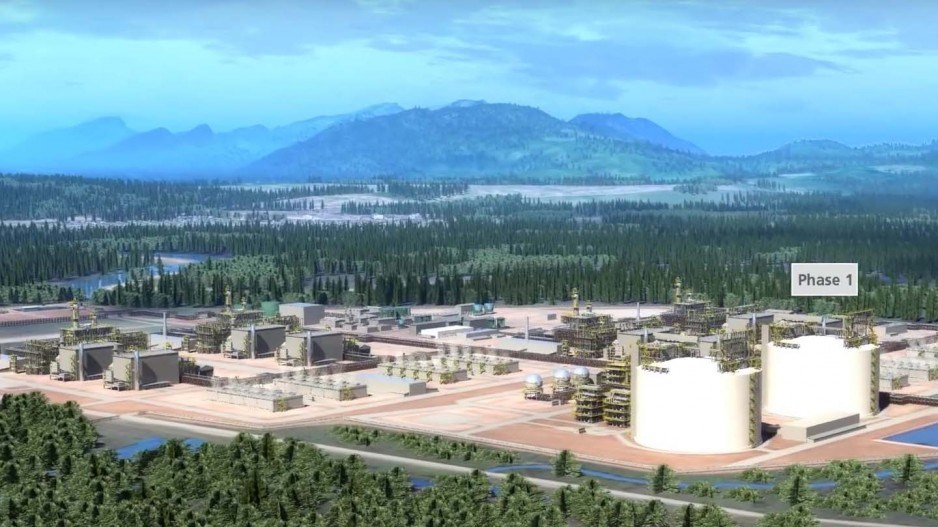When B.C.’s economic boom appeared to have run its course, Canada’s largest private-sector capital project picked up the baton.
“LNG, that’s huge – very big for the province,” said Ken Peacock, chief economist and vice-president of the Business Council of British Columbia. “That will in large part fill the hole created by real estate, but not fully.”
With a liquefied natural gas (LNG) ramp-up in the north and a real estate slowdown in the southwest, B.C.’s economic outlook is significantly stronger than it would be if the province were one $40 billion project poorer.
Without LNG Canada’s positive final investment decision, Peacock said, growth next year would have charted well below 2%. Now, he’s anticipating growth between 2% to 2.4% for 2019. The Royal Bank of Canada has revised B.C.’s growth up to 2.6%, from 1.9%. TD Canada expects LNG Canada will deliver B.C. a modest 0.1% boost in real gross domestic product growth next year, and 0.6% in 2020.
A multibillion-dollar investment in LNG is not, however, a panacea for weakness within B.C.’s borders. While the province is more diversified than others and less vulnerable to energy price shocks or U.S. trade threats, a cooling real estate market, record-high levels of consumer debt and an extremely tight labour market will weigh on the economy in 2019 and beyond.
“The weakening of the real estate market is very, very, very significant,” said Peacock, pointing out that a dramatic slowdown in that market has implications for many other industries such as the legal and financial sectors.
It could mean a reversal of the “wealth effect” experienced by owners in the Lower Mainland, who may slow down their consumption of goods and services as home prices and sales fall. In 2017, B.C. retail trade in certain months rose by more than 10% above 2016 levels. The most recent Statistics Canada data for 2018 shows B.C.’s year-over-year retail trade growth is hovering around 1%.
The province is also operating at full capacity. B.C. has the lowest unemployment rate in the country at 4.4%, as well as Canada’s highest job vacancy rate at 4.7%. Both figures beat national averages by a significant margin.
“In 2019 you’re going to see the hiring challenges intensify,” Peacock said. In construction and trucking, for example, vacancy is already at 7% and 10%, respectively.
Niels Veldhuis, president of the Fraser Institute, sees LNG Canada’s investment as an anomaly, and said political uncertainty and a wave of tax increases will deter foreign investors from B.C. in the years ahead.
“If you look at B.C.’s tax competitiveness, that has declined substantially,” said Veldhuis.
From 2007 to 2017, Statistics Canada data shows foreign direct investment in the country fell 74%.
“People are looking elsewhere for investment opportunities. They are not looking at Canada; they are not looking at British Columbia,” Veldhuis said.
Despite that, B.C. appears to be in a fairly strong fiscal position to weather any major economic issues in the year ahead, such as a U.S. economic slowdown, said Kevin Milligan, professor of economics at the University of British Columbia’s Vancouver School of Economics.
“If I had to guess, the budget surplus that we’ll see at the end of the fiscal year is going to be bigger than what they anticipate now,” Milligan said. “We’re talking closer to $2 billion, which is big news.”
“There is unlikely to be any fiscal need for tax increases. But also it gives the provincial government a lot of room to smooth over some potential problems,” he added, pointing out that corrections to the finances of the Insurance Corp. of British Columbia or BC Hydro would likely be wiser decisions for surplus spending, rather than multi-year commitments that could run up against a U.S. slowdown.
It won’t materialize next year, but as LNG Canada progresses – and if the province sees one or two other investments in LNG – B.C. could see a shift in the regions responsible for its growth.
“It’s been a Metro Vancouver growth story for many, many years,” Peacock said. “But I think with LNG, you’re going to see a little bit of a shift in that dynamic.
“Growth is going to be at a minimum more balanced between the Lower Mainland and the northern half of the province, and it could even be sort of pulled up.” •




